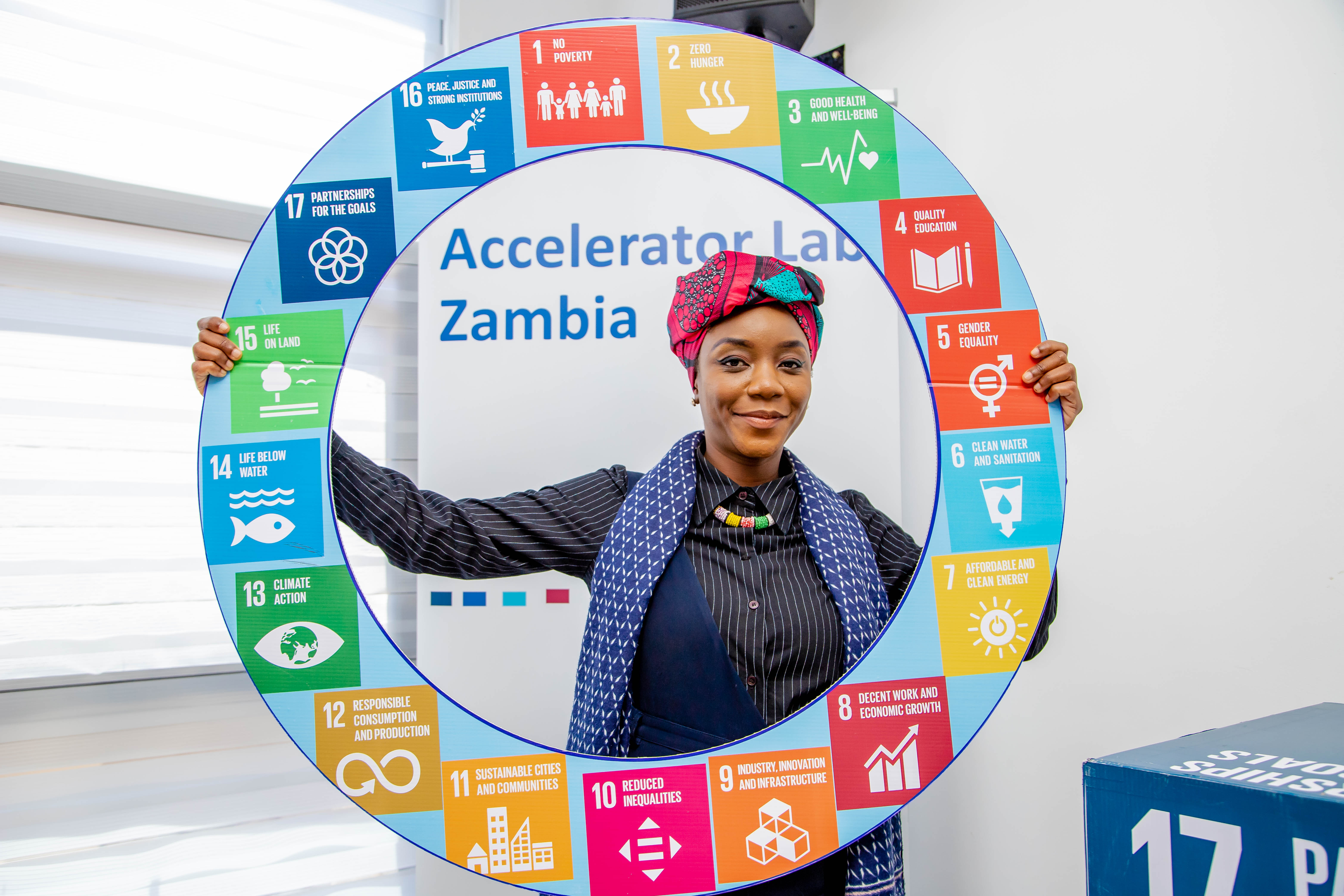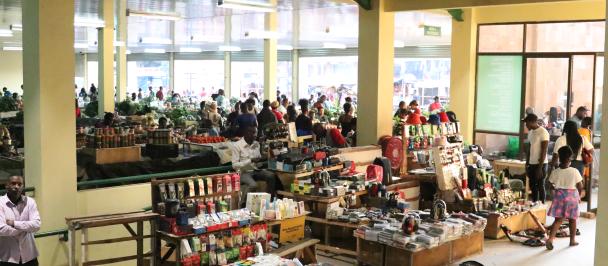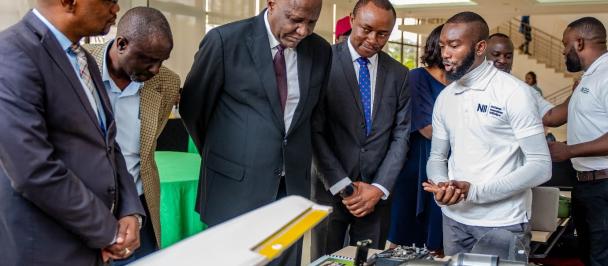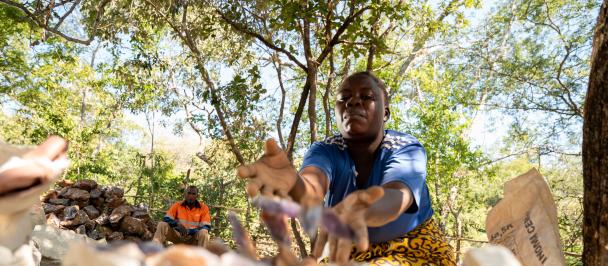Merging Minds and Markets: The Harmonious Bond Between Innovators and Academia
April 22, 2024

Precious Mwamulima, a finalist of the Climate Change and Energy Experimentation Prorgramme
One of the key elements of the Accelerator Lab's approach is harnessing the power of partnerships, including academia, to accelerate progress towards the achievement of Sustainable Development Goals (SDGs) and the agenda 2030. Engaging academia has unfolded at different levels in supporting the growth of innovations in Zambia, from supporting the selection of viable innovations through evaluations to the more substantial efforts leveraging academic research prowess in providing research and development mentorship that leads to the creation of viable prototypes. This collaborative effort relies on surfacing novel local homegrown initiatives that have potential to deliver transformative impact in society, by responding to pressing challenges the country/communities or industry is experiencing.
Academia emerges as a crucial catalyst in scaling innovations hence the Accelerator Lab in Zambia’s collaboration with renowned research institutions in Zambia such as the National Institute for Scientific and Industrial Research (NISIR) and the Copperbelt University (CBU saw the launch of the Climate Change and Energy Experimentation Programme in 2021, which aimed to pave way for innovators to seek academic mentorship and research rigor to grow their solutions to the country’s climate and energy challenges. This strategic partnership allowed innovators to validate their ideas and prototypes thereby enhancing the commercial viability and credibility of their innovations. With the Experimentation Programme underway, the journey of innovation is accelerated by pairing innovators with research mentors from academia and institutions such as NISIR and UNZA. This collaboration bridges the intellectual stimulation of research and academic knowledge with the practicality of commercial viability, resulting in robust and sustainable innovations.
The interest in climate change was necessitated by its negative impact on Zambia, leading to increased droughts, floods, and changes in the season. Consequently, affecting the agriculture, wildlife, forestry, water, energy, and health sectors. Through a portfolio approach, the Climate Change and Energy Experimentation Programme aimed to support the National Innovation Initiative (NII) finalists in testing, nurturing, and scaling solutions addressing climate change. To ensure that the Experimentation Programme was inclusive, deliberate action was taken to focus on harnessing youth-led, women-led, and disability-inclusive innovations that hold the potential for transformative impacts. Since its establishment, the programme has equipped 12 innovators with Research and Development (R&D) support through Research mentorship leveraging academic and research partners to support the generation of rigorously developed evidence to support the growth journey of their innovations into commercially and socially viable solutions. Additionally, the innovators also had access to entrepreneurial and business development skills to empower these innovators to build thriving enterprises. Read more on the journey of these individual innovators here.
Navigating the union between the cerebral allure of academia and the brisk pace of commercial innovation is an adventure filled with enlightening discoveries. This journey reveals the sweet spot where academic curiosity meets market-ready products — a fusion every innovator and academic institution dreams of. For those involved in crafting innovation programmes or simply intrigued by the melding of knowledge and practicality, buckle up for an insightful read.
Cultivating an Innovator's Mindset: Beyond Just Ideas
True innovation is not just about having groundbreaking ideas; it's about nurturing a forward-thinking, open-minded approach. Innovators are the trailblazers who dare to question the usual, challenge conventional wisdom, and validate their theories with solid data. However, the path is not without its hurdles. From the lengthy waits for experimental results to the harsh reality that some ideas might not work as anticipated, the journey of innovation is fraught with challenges. But here lies the essence: resilience. Innovators must adopt an iterative mindset, accepting that the road to validation and certification might be longer and bumpier than anticipated, but equally more rewarding.
Striking the Balance: Research Meets Market
In the academic realms, particularly within the vibrant educational landscape of Zambia, researchers are motivated by the pursuit of new knowledge, the thrill of lecturing, and the intellectual challenge of untangling complex issues. However, the absence of research tenure in many public universities sparks a critical question: how can we bridge the gap between academic motivations and the burgeoning need for marketable solutions? The answer lies in creating an ecosystem that nurtures both academic ambitions and commercial objectives, fostering a mentorship environment geared towards not just discovery, but also market feasibility and product development.
Unpacking R&D Costs and Exploring New Frontiers
Embarking on research and development is undoubtedly a costly affair, demanding significant investment in time, resources, and brainpower. Yet, this financial hurdle is where the magic of collaboration and innovation spaces, such as the rising concept of UniPods, comes into play. These spaces offer a sanctuary for creativity and experimentation, where academic brilliance can merge with practical innovation strategies, reducing overheads and streamlining the path from idea to product. The rise of such environments is a testament to the evolving landscape of innovation, where costs are not just expenses but investments into the future of technology and knowledge.
The merging of minds and markets is a powerful union that drives innovation towards commercial viability and social impact. UNDP's Climate Change and Energy Experimentation Programme, in collaboration with NISIR and Copperbelt University, symbolizes the country's commitment to sustainable development and the realization of the SDGs. Through rigorous experimentation, evidence-based approaches, and disruptive interventions, Zambia is poised to pave the way for a future where innovation leads to tangible, positive change.
Watch some of the Experimentation Programme Innovators Videos in the playlist below

 Locations
Locations








